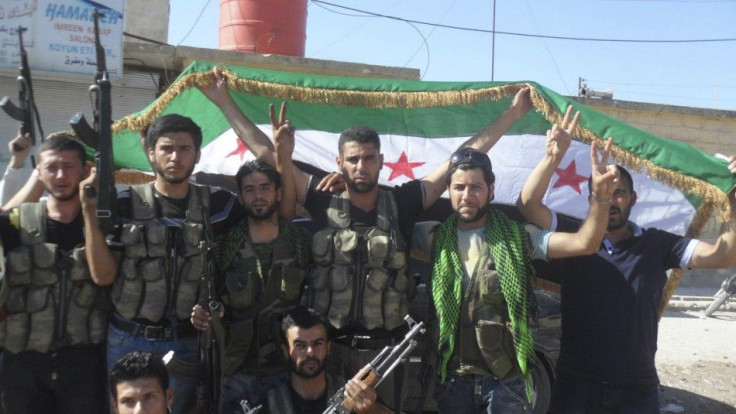Al-Qaeda's Role In Syria Causes Alarm; Russia Slams US For Justifying Terrorism

Amid reports that Islamic fundamentalists are trying to hijack the Syrian revolution, which have raised concerns among U.S. intelligence and Iraqi officials, Russian Foreign Minister Sergei Lavrov slammed Washington's position over the Damascus bombing that killed several top Syrian officials, as "a direct whitewashing of terrorism."
Lavrov Wednesday said the militants who seized control of posts from regime forces on Syria's border with Turkey had direct links with al-Qaeda, countering claims that the border gates were under the control of the rebel group, Free Syrian Army.
"According to some information, these checkpoints were seized not by the Free Syrian Army at all - whatever one thinks about it - but by groups directly linked with al Qaeda," Lavrov said at a news conference with his Cypriot counterpart, according to a Reuters report.
"We are double-checking this," Lavrov said. "If such processes - the seizure of territory by terrorists - are supported by our partners, then we would like to receive an answer to the question of what their position on Syria is, what they are trying to achieve in that country."
Responding to the U.S. Department of State spokesperson Victoria Nuland's remarks that the attack on Syrian President Bashar al-Assad's inner circle was "not surprising," Lavrov said: "This is a direct justification of terrorism. How should one understand that?"
However, the leaders of the Syrian opposition continued to deny the role of the Islamic militants in the uprising despite the evidence that has surfaced pointing at al-Qaeda's involvement.
In a video uploaded Feb 28, men armed with AK-47s and claiming to be the Free Syrian Army, but in the backdrop of two al-Qaeda flags, were seen saying in classical Arabic: "We are now forming suicide cells to make jihad in the name of God."
The Syrian situation is being likened to the al-Qaeda-led Sunni insurgency in Iraq which aims at establishing a single, transnational Islamic state based on Sharia, after the country was invaded in 2003.
Iraqi officials said that in many cases, the al-Qaeda militants operating in Iraq had unleashed the violence against the Syrian forces. "We are 100 percent sure from security coordination with Syrian authorities that the wanted names that we have are the same wanted names that the Syrian authorities have, especially within the last three months," Izzat al-Shahbandar, Iraqi prime minister Nuri Kamal al-Maliki's close aide, said Tuesday, according to a New York Times report. "Al-Qaeda that is operating in Iraq is the same as that which is operating in Syria," he said.
The Syrian rebels hit right at the heart of the regime July 18, with a bomb blast that killed three top Syrian officials, including the Defense Minister and President Bashar al-Assad's brother-in-law.
Lavrov criticized Susan Rice, the U.S. envoy to the U.N., who said that the Damascus bombing called for enforcement of the U.N. Charter chapter VII that sanctions the use of force.
"This is a terrible position, all in all. I can't even find words to express our attitude to that," Lavrov commented about the attack which Moscow had earlier termed as an "act of terror."
Washington had responded to the bombing, saying it showed the uprising was gaining "real momentum" while urging other countries to press the president to quit.
"There is real momentum against Assad, with increasing defections, and a strengthened and more united opposition that is operating across the country," White House spokesman Tommy Vietor said July 18. "We are working urgently with our international partners to push for a political transition in Syria."
British Foreign Secretary William Hague had condemned the attack and said it "confirms the urgent need for a Chapter VII resolution of the UN Security Council on Syria."
© Copyright IBTimes 2025. All rights reserved.






















